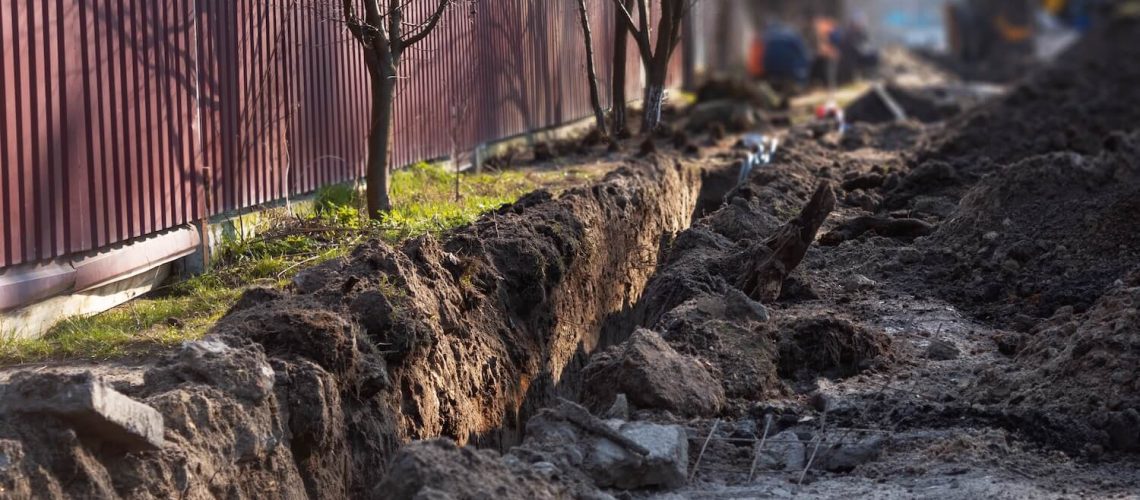Trenching is a critical process in various construction and infrastructure projects, ranging from utility installations to drainage solutions. While trenching may seem straightforward, it is a task fraught with complexity and potential risks. Engaging professional trenching services is often the best decision to ensure that your project is completed safely, efficiently, and in compliance with all regulations.
This article delves deeply into the many advantages of hiring professional soil trenching contractors and explores why their expertise can make a significant difference in the success of your project.
The Significance of Trenching
Trenching involves the excavation of narrow, deep ditches in the ground for various purposes. Its importance cannot be overstated, as it serves as the foundation for:
- Utility Installation: Trenching is essential for laying down infrastructure such as water pipes, electrical cables, gas lines, and telecommunications systems.
- Drainage Systems: Proper trenching helps in setting up effective drainage systems to manage stormwater, prevent flooding, and protect properties.
- Foundation Work: For construction projects, trenching prepares the ground for building foundations or retaining walls, ensuring structural stability.
The successful execution of trenching tasks directly impacts the functionality, safety, and durability of the installed infrastructure. Here’s why trenching matters:
- Safety: Proper trenching techniques reduce the risk of cave-ins and accidents, safeguarding workers and the surrounding environment.
- Functionality: Accurate trenching ensures that installed systems perform as expected, reducing the likelihood of malfunctions or failures.
- Compliance: Adhering to local regulations and codes is essential for legal and operational reasons, avoiding fines and project delays.
The Complexity of Soil Trenching Projects
Trenching is far from a one-size-fits-all endeavor. The complexity of trenching projects can vary based on several factors:
1. Soil Conditions
The type of soil plays a significant role in trenching operations:
- Clay: Clay soil tends to be heavy and can become unstable when wet. This may require additional shoring or stabilization methods to prevent collapses.
- Sand: Sandy soil lacks cohesion, making it prone to collapse. It often requires special techniques to ensure trench stability.
- Rock: Trenching through rock is challenging and may necessitate specialized equipment and techniques to break through the hard surface.
Understanding the soil conditions at the site is crucial for selecting appropriate excavation methods and equipment.
2. Depth and Width
The dimensions of a trench depend on the specific requirements of the project:
- Depth: The depth of the trench must accommodate the infrastructure being installed and allow for proper backfill and compaction.
- Width: The width of the trench should be sufficient for safe installation and access, but not so wide as to cause excessive soil disturbance or require additional shoring.
Incorrect trench dimensions can lead to functional issues, safety hazards, or damage to existing utilities.
3. Utility Location
Existing utilities such as water lines, gas pipes, and electrical cables must be carefully avoided during trenching:
- Mapping Utilities: Accurate mapping and location of existing utilities are essential to prevent accidental damage, which can result in costly repairs and safety hazards.
- Coordination: Coordinating with utility providers and obtaining necessary permits helps ensure that trenching does not interfere with existing services.
4. Drainage and Erosion Control
Proper drainage and erosion control are critical for maintaining trench stability:
- Drainage Systems: Implementing effective drainage systems helps prevent water accumulation in the trench, reducing the risk of collapse.
- Erosion Control: Techniques such as silt fencing and berms can prevent soil erosion and protect the surrounding environment.
The Professional Job Advantage
Hiring professional trenching contractors offers numerous benefits that can significantly impact the success of your project. Here’s how their expertise and services make a difference:
1. Expertise and Experience
Professional trenching contractors bring a wealth of experience and knowledge to the job:
- Technical Skills: Experienced contractors understand the complexities of different soil types, trench dimensions, and utility placements. Their technical skills ensure that trenches are dug accurately and safely.
- Problem Solving: Professionals are adept at addressing unexpected challenges, such as encountering rock or unforeseen utility lines. Their problem-solving abilities help keep the project on track.
2. Specialized Trenching Equipment
Professional contractors use advanced equipment tailored for trenching tasks:
- Trenchers: These machines are designed specifically for digging narrow trenches quickly and efficiently. They offer precision and speed that manual methods cannot match.
- Backhoes and Excavators: Versatile equipment used for digging and moving soil, suitable for a range of trenching applications.
The use of specialized equipment enhances precision and efficiency, reducing project time and improving results.
3. Compliance with Regulations
Local building codes and regulations often impose specific requirements for trenching projects:
- Safety Regulations: Regulations for shoring, shielding, and sloping to prevent trench collapse.
- Utility Regulations: Standards for marking and avoiding existing utilities.
- Environmental Regulations: Requirements for managing soil erosion and protecting natural resources.
Professional contractors are well-versed in these regulations and ensure that their work complies with all legal standards, preventing potential legal issues and ensuring project approval.
4. Safety Measures
Trenching involves inherent safety risks, including:
- Cave-Ins: Collapsing trench walls can pose serious dangers to workers and equipment.
- Falling Loads: Objects or soil falling into the trench can cause injuries.
- Utility Strikes: Accidental damage to utilities can lead to hazardous situations.
Professional contractors implement stringent safety measures:
- Shoring and Shielding: Techniques to stabilize trench walls and prevent collapses, using equipment like trench boxes and hydraulic shoring systems.
- Protective Systems: Measures to safeguard workers and equipment from falling loads and other hazards.
- Safety Training: Ensuring that all personnel are trained in safety protocols and emergency procedures.
By adhering to safety standards and protocols, professionals mitigate risks and ensure a safer working environment.
5. Accurate Assessment and Planning
Before starting a trenching project, professionals conduct a thorough site assessment:
- Soil Testing: Evaluating soil conditions to determine the best excavation methods and equipment.
- Utility Location: Identifying and mapping existing utilities to avoid damage.
- Trench Design: Planning trench dimensions and layout based on project requirements and safety considerations.
This meticulous planning helps prevent issues such as collapsed trenches or damage to existing infrastructure.
6. Efficient Project Management
Professional trenching contractors excel in managing the excavation process:
- Scheduling: Coordinating excavation with other project phases to avoid delays and ensure timely completion.
- Resource Management: Efficiently using equipment and personnel to maximize productivity and minimize downtime.
- Communication: Liaising with other contractors and stakeholders to ensure smooth project execution and resolve any issues that arise.
Effective project management ensures that trenching is completed on time, within budget, and according to specifications.
7. Long-Term Cost Savings
While the initial cost of hiring professionals may seem high, it often leads to long-term savings:
- Reduced Repairs: Properly executed trenching minimizes the need for costly repairs and maintenance due to errors or inadequate work.
- Avoided Delays: Efficient work reduces project delays and associated costs, keeping the overall project budget in check.
- Increased Longevity: Proper installation ensures that infrastructure remains functional and reliable over time, reducing the need for future interventions.
Investing in professional trenching services can lead to significant cost savings and better overall project outcomes.
Choosing the Right Trenching Professionals
Selecting the right trenching contractor is essential for ensuring a successful project. Here are key considerations when choosing a contractor:
1. Experience and Reputation
Look for contractors with a proven track record of successful trenching projects. Consider the following:
- Client Reviews: Read reviews from previous clients to gauge the contractor’s reliability and quality of work.
- References: Ask for references and contact previous clients to get firsthand feedback about their experience.
- Portfolio: Review the contractor’s portfolio of completed projects to assess their capabilities and expertise.
2. Licensing and Insurance
Ensure that the contractor holds the necessary licenses and insurance to perform trenching work:
- Licensing: Verify that the contractor is licensed to operate in your area and has the required qualifications.
- Insurance: Check that the contractor has insurance coverage to protect against potential liabilities, such as accidents or property damage.
3. Equipment and Technology
Verify that the contractor uses modern equipment and technology for trenching:
- Trenchers and Excavators: Ensure that the contractor uses well-maintained and advanced equipment suited for the project’s needs.
- Technology: Check if the contractor employs technology for site assessment, planning, and execution, which can enhance accuracy and efficiency.
4. References and Portfolio
Request references from previous clients and review the contractor’s portfolio:
- Previous Projects: Look at examples of similar projects to assess the contractor’s experience and expertise in handling trenching tasks.
- Client Feedback: Gather feedback from past clients to understand their satisfaction with the contractor’s work and professionalism.
Conclusion
Trenching is a crucial component of many construction projects, and its success relies on careful execution and adherence to safety and regulatory standards. While the idea of handling trenching tasks on your own might seem appealing, the advantages of hiring professional trenching contractors far outweigh the costs.
Professional trenching contractors bring a wealth of expertise, specialized equipment, and a commitment to safety and compliance. Their ability to accurately assess and plan, efficiently manage projects, and ensure long-term cost savings makes them an invaluable asset. By investing in professional trenching services, you not only achieve better project outcomes but also mitigate risks and avoid potential pitfalls.

